- Home
- Gerald Durrell
The Drunken Forest
The Drunken Forest Read online
Bello:
hidden talent rediscovered!
Bello is a digital only imprint of Pan Macmillan, established to breathe new life into previously published, classic books.
At Bello we believe in the timeless power of the imagination, of good story, narrative and entertainment and we want to use digital technology to ensure that many more readers can enjoy these books into the future.
We publish in ebook and Print on Demand formats to bring these wonderful books to new audiences.
About Bello:
www.panmacmillan.com/imprints/bello
About the author:
www.panmacmillan.com/author/geralddurrell
By Gerald Durrell
My Family and Other Animals
A Zoo in My Luggage
Birds, Beats and Relatives
Garden of the Gods
The Overloaded Ark
The Talking Parcel
The Mockery Bird
The Donkey Rustlers
Catch me A Colobus
Beasts In My Belfry
The New Noah
The Drunken Forest
The Whispering Land
Rosy is My Relative
Two in the Bush
Three Singles to Adventure
The Ark’s Anniversary
Golden Bats and Pink Pigeons
Menagerie Manor
The Picnic and Suchlike Pandemonium
The Bafut Beagles
Marrying off Mother and Other Stories
The Aye-Aye And I
Fillets of Plaice
Ark on the Move
Encounters with Animals
The Stationary Ark
Gerald Durrell
THE DRUNKEN FOREST
For my wife
Jacquie
in memory of Prairie Pigs
and other Bichos
Contents
Explanation
Saludos
1. Oven-Birds and Burrowing Owls
2. Eggbert and the Terrible Twins
Interlude
3. Fields of Flying Flowers
4. The Orange Armadillos
5. Bevy of Bichos
6. Fawns, Frogs and Fer-de-Lance
7. Terrible Toads and a Bushel of Birds
8. The Four-eyed Bird and the Anaconda
9. Sarah Huggersack
10. Rattlesnakes and Revolution
Interlude
11. The Rhea Hunt
Adios!
Acknowledgements
A Message from the Durrell Wildlife Conservation Trust
Explanation
This is an account of a six months’ trip that my wife and I made to South America in 1954. Our plan was to make a collection of the strange animals and birds found in this part of the world and bring them back alive for zoos in this country. From our point of view the trip was a failure, for, owing to a number of unforeseen circumstances, all our plans were upset. Our trip was to be divided into two parts. First, we were to make our way down to the southernmost tip of the Continent, Tierra del Fuego, to collect ducks and geese for the Severn Wildfowl Trust. On arrival in Buenos Aires we found that it was the holiday season, and all the planes flying south to the Argentine lakes and thence to Tierra del Fuego were booked for months in advance. Shipping was equally difficult. It was impossible for us to reach our destination in time to capture the nestlings, as we had hoped to do, so very reluctantly we called that part of the trip off. Our second plan was to go to Paraguay, spend some weeks collecting there, and then work our way back to Buenos Aires in easy stages by the Parana and Paraguay Rivers. This plan was also thwarted, though in this case the reasons were political. So we returned from South America with only a handful of specimens in place of the large collection we had hoped for. However, even a failure has its lighter side, and this I have tried to portray in this book.
The failure of our trip was in no way due to lack of sympathy or support from people both here and in Argentina, and we owe a very great debt of gratitude to a vast number of individuals. Our thanks will be found in the acknowledgements at the end of the book.
Saludos
As the ship nosed its way into port we leant on the rail and gazed at the panorama of Buenos Aires gradually curving around us. The sky-scrapers reared up under a vivid blue sky like multi-coloured stalagmites, their surfaces pitted with a million flashing windows. We were still staring raptly when the ship had tied up alongside the tree-lined docks, and the enormous buildings loomed over us, sending their shivering, Venetian-blind reflections across the rippling black water. Our meditations on modern architecture were interrupted by a man who looked so extraordinarily like Adolphe Menjou that for a moment I wondered if we had come to the right end of the American continent. Picking his way disdainfully through the gesticulating, yelling, garlic-breathing mob of immigrants that thronged the deck, he arrived in front of us, calm, unhurried, and looking so immaculate that one could hardly believe the temperature was ninety in the shade.
‘I am Gibbs from the Embassy,’ he announced, smiling. ‘I’ve been looking all over First Class for you; no one told me you were travelling down here.’
‘We didn’t know we’d be travelling down here until we got on board,’ I explained, ‘but by then it was too late.’
‘It must have been a rather . . . er . . . unusual voyage for you,’ said Mr Gibbs, glaring at a large Spanish peasant who had expectorated with enthusiasm within an inch of his foot, ‘and rather on the moist side, I should have thought.’
I began to like Mr Gibbs tremendously.
‘This is nothing,’ I said airily; ‘you should have been here when the weather was rough; it was positively damp then.’
Mr Gibbs shuddered delicately.
‘I should imagine you will be rather glad to get ashore,’ he said. ‘Everything’s in order, and we should have you through the Customs in next to no time.’
My liking for Mr Gibbs was reinforced with considerable respect when he sauntered carelessly into the Customs shed, smiling and exchanging a word or two here and there with the officials, suave and unruffled. From his pockets he produced gigantic forms covered in a rash of red seals that whisked our eccentric luggage through the shed and out the other side into a brace of taxis within ten minutes. Then we were whirled through streets that appeared to be as broad as the Amazon, lined with sky-scrapers, trees, and beautifully laid out parks. Within an hour of our arrival we were installed, six floors up, in a lovely flat overlooking the harbour. Mr Gibbs had drifted off to the Embassy, presumably to perform a few more miracles before lunch, and we were left to recover from our voyage. After half an hour’s training in the intricate art of using the Argentine telephone, we spent a merry hour ringing up all the people we had introductions to and telling them that we had arrived. There were quite a number of these, for my brother had spent some time in Argentina and, displaying a rather cold-blooded indifference to the fate of his friends, had supplied me with their names and addresses. A few days before we had left England a postcard had arrived from him on which was scribbled the cryptic message: ‘In B.A. don’t forget to contact Bebita Ferreyra, Calle Posadas 1503, our best friend in Argentina. She is a sweetie.’ I frequently receive this sort of information from my brother. So, acting on instructions, we phoned Bebita Ferreyra. When she came on the line my first impression was that she had a voice like the coo of a wood-pigeon. Then I decided it was something much more attractive than this: it was the coo of a wood-p
igeon with a sense of humour.
‘Mrs Ferreyra? My name is Gerald Durrell.’
‘Ah, you are Larry’s b-b-brother? B-b-ut where are you? Twice I phoned the Customs to find if you had arrived. Can you come to lunch?’
‘We’d love to . . . Can we get to your place by taxi?’
‘But naturally. Come about one. Good-bye.’
‘She sounds an extraordinary sort of woman,’ I said to Jacquie as I put down the phone. I had no idea then that I was making the understatement of the century.
At one o’clock we were ushered into a large flat in a quiet street. On the tables were strewn a multitude of books on a variety of subjects – painting, music, ballet – and among them novels and magazines in three languages. The piano was similarly decorated with music ranging from opera to Chopin, and the radiogram was surrounded by records which included Beethoven, Nat King Cole, Sibelius, and Spike Jones. Even Sherlock Holmes, I felt, would have been unable to make a lightning diagnosis of character from these clues. On one wall hung a portrait of an exceptionally lovely woman in a large hat. On the beautiful face was an expression which was at once humorous and calm. It was, in fact, the sort of face that exactly fitted the voice I had heard on the telephone.
‘D’you think that’s her?’ asked Jacquie.
‘Very likely. But I expect that was painted years ago. I shouldn’t think she looks a bit like that now.’
At that moment there were quick, firm footsteps in the hall, and Bebita entered. I took one look at her and decided that, in comparison to the portrait, the portrait definitely came a very poor second. She was the nearest approach to a Greek goddess that I have ever seen.
‘I am B-B-Bebita Ferreyra,’ she said, and appeared to understand our astonishment, for the amused expression in her blue eyes deepened.
‘I hope you didn’t mind us phoning you?’ I said; ‘only Larry told me I must contact you.’
‘B-b-but naturally. I should have b-b-been insulted if you had not.’
‘Larry said to give you his love.’
‘And how is Larry? Ahh, he is an angel, that man; you have no idea what an angel he is,’ she said.
It was only later that I discovered Bebita described everyone thus, however charming or malignant. At the time I found it a trifle astonishing to hear this term used to describe my brother. Of all the descriptions I could have thought of, this one seemed the least appropriate. We fell under Bebita’s unique spell during that first meeting, and from then on we practically lived at her flat, eating tremendous and beautifully constructed meals, listening to music, talking nonsense, and enjoying ourselves. Very soon we came to rely on her for nearly everything. The most fantastic requests never ruffled her, and she always managed to accomplish something.
The first blow to our plans for the trip fell within three days of arriving in Buenos Aires. We discovered that the chances of our being able to get down to Tierra del Fuego were, to say the least, remote. The airline company were polite but depressing. If we cared to wait ten days or so it was possible that they might have a cancellation, but they could not promise. Gloomily we said that we would wait and see. It was Ian who suggested that, instead of mooching round Buenos Aires for ten days in a depressed and irritated frame of mind, we make a trip into the countryside near the city. Ian is an old friend of mine whom I had met in England during the war. In a moment of rash enthusiasm he said that I should really come out to Argentina on a collecting trip. If I did, he would do all he could to help; now he was stuck with us. He went to see his cousins, the Boote family, who owned a large estancia near the coast, some hundred odd miles from the capital. They, with a generosity that is typical of Argentina and all who live there, said they would be delighted to have us.
So early one morning the Bootes’ car collected us. Ian hoisted his lugubrious and lanky frame from the depths and introduced us to a beautiful blonde sitting in the front seat, who turned out to be Elizabeth Boote, daughter of the house. Apart from her loveliness, we soon discovered that she had a remarkable ability to sleep; anywhere, at any time, you would find her sleeping peacefully and deeply, ignoring any minor uproar that happened to be taking place around her. This remarkable gift made us nickname her Dormouse, a name that she took grave exception to, but which nevertheless stuck.
Oven-Birds and Burrowing Owls
Argentina is one of the few countries in the world where you can go on a journey, and when half-way there see both your starting point and your destination. Flat as a billiard table, the pampa stretches around you, continuing, apparently, to the very edge of the earth. Here and there it is blurred with purple where the thistle grows, and here and there lies a dark rib of trees, but otherwise nothing breaks the smooth expanse of grass.
After we had left the outskirts of Buenos Aires behind, the blond and ivory sky-scrapers dwindling and shimmering in the haze like some curious crystal formation on the horizon, the road lay straight as a lance through the grassland. In places the roadside was crowded with rather fragile-looking bushes covered with pale green leaves and minute golden flowers. These flowers were so tiny, but grew in such profusion, that from a distance they could not be seen as individual blooms, giving instead a curious golden radiance to the bushes, as though each plant were wearing a misty halo around it. From among these bushes flew scissortails as we passed, small black-and-white birds with immensely elongated tail-feathers. They have a curious dipping flight, and with each dip the tail-feathers would open and close like the blades of a pair of scissors. Occasionally a chimango hawk would fly across the road on heavy, blunt wings, looking clean and portly in its chocolate-brown-and-caramel plumage.
After an hour or so of driving, we turned off the main road on to a country track, deeply rutted and dusty, its edge lined with neat fencing. I noticed on each fence-pole strange lumps of what appeared to be dried mud; they reminded me of the termites’ nests I had seen in Africa, but I thought it unlikely that termites would be found this far south in the world. I was puzzling over these curious protuberances when suddenly a bird flew out of one, a bird resembling the English robin in shape, with a plump breast and a pert tail. It was about the size of a thrush, with a pale fawn breast and rich rusty red upper parts. It was an oven-bird, and immediately I saw it I realized that all those peculiar hummocks of mud decorating the fence-posts were the extraordinary nests of which this bird was the architect and chief mason. Later I found that the oven-bird is one of the commonest, as well as one of the most endearing, of the Argentine birds, and its nests are as much a feature of the landscape as the giant thistles.
Now that our route curved towards the sea, we entered the swampy lands, and the edges of the roads were lined with wide, water-filled ditches, while vivid green patches on the golden grass of the pampa denoted the presence of wider stretches of water, thickly fringed with reed. The place of the oven-birds, scissortails, and chimangos was taken by waders and waterfowl. Screamers – great ash-grey birds the size of turkeys – rose from the roadside in strong but ungainly flight, giving their broken, flute-like cries of ‘Wheeup . . . wheeup . . . wheeup’ as they circled round. On the still, gleaming expanses of water, flocks of ducks swam, looking like plump, sleek business men hurrying to catch a train. There were grey teal, tiny and neat with their steel-blue beaks and black caps; red shovellers, heavy birds with vacant expressions behind the long spade-shaped beaks; rosy-bills, immaculate in their gleaming black-and-grey plumage, their beaks looking as though they had been freshly dipped in blood; drab little black-headed ducks, that swam among the others in a self-effacing way that was almost hypocritical, for this bird has emulated the habits of the cuckoo, laying its eggs in others’ nests, so that they are adopted and the hard work of hatching and rearing is done by some other and easily hoodwinked species. On the mud flats were a scattering of herons; great jostling crowds of glossy ibis, whose long, curved beaks and deep mourning plumage contrasted strange
ly with their exuberant spirits as they pecked each other, pirouetted and flapped in the shallows. Here and there among them were smaller groups of scarlet ibis, vivid as shreds of a sunset against the darker plumage of their cousins. On the more open and extensive patches of water swam royal squadrons of black-necked swans, beautiful and unhurried, their foam-white plumage contrasting with the deep black of the head and delicately arched neck. Like courtiers among the proud flocks of black-necks were swimming a few coscoroba swans, dumpy, plain white, and definitely barnyard-looking. Also on these larger sheets of water were small skeins of flamingos, feeding in the shallows against the tall reeds. From a distance they were like moving heaps of pink and scarlet roses against the green. Each paced slowly and methodically in the dark waters, head down, neck curved in the shape of a large pink ‘S’, each bird attached by its sealing-wax pink legs to a blurred, shimmering reflection of itself. Drugged with such a gorgeous banquet of bird life, I sat in the car in a sort of ornithological stupor, noticing nothing but the glittering of feathered bodies, the splash and wrinkle of smooth water, and the flash of wing.
The car swerved suddenly off the track, bounced down a narrow lane shining with puddles, through a copse of giant eucalyptus trees, and drew up outside a long, low, white building that might have been an English farmhouse. In the front seat Dormouse Boote awoke from a sleep that had lasted unbroken since we left the capital, and surveyed us with dreamy blue eyes.
‘Welcome to Los Ingleses,’ she said, and yawned delicately.
The house inside had a delightfully Victorian flavour, with its dark and massive furniture, its animal heads and faded prints on the walls, its stone-flagged passages, and everywhere the faint and pleasantly astringent smell of paraffin from the tall, gleaming, mosque-like lamps. The room Jacquie and I occupied, though large, was dwarfed by an immense feather bed which was obviously straight out of Hans Andersen’s story of ‘The Princess and the Pea’. It was a bed to end all beds, almost as big as a tennis-court and as thick as a bale of hay. It enveloped you, when you lay on it, in a voluptuous embrace; you sank fathoms deep into its thistle-down-soft depths, and were lulled immediately into a sleep so complete and so relaxed that your rage on being awoken was almost homicidal. The window of the room, looking out on to the smooth lawn and rows of diminutive fruit trees, was fringed with eyelashes of blue-flowered creeper. Hung among the flowers, in such a position that I could see it from where I lay in bed, was a humming-bird’s nest, a tiny cup the size of half a walnut shell, containing two pea-size white eggs. The morning after our arrival, as I lay in the warm depths of the gargantuan bed, sipping my tea, I watched the female humming-bird sitting quietly on her eggs, while her mate hovered and flipped among the blue flowers, like a microscopic, glittering comet. Bird-watching in these circumstances had a very great deal to be said for it, but at length Jacquie refused to believe that, under those conditions, I was adding greatly to ornithological knowledge of the family trochilidae, so I was dragged reluctantly from the octopus-like embrace of the bed and forced to dress. Having done so, I was revolted at the thought that Ian might still be asleep, and strode across the passage to his room, determined to rout him out. I found him clad in pyjamas and a poncho, that useful Argentine garment that resembles a blanket with a hole in the middle through which you stick your head. He was squatting on the floor, sucking at a slender, silver pipe that was immersed in a small, round, silver pot which contained a dark and rather revolting-looking liquid with what appeared to be bits of grass floating on the top.

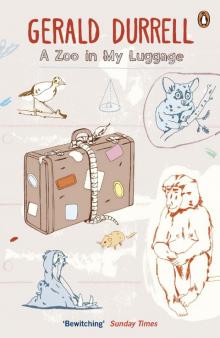 A Zoo in My Luggage
A Zoo in My Luggage The New Noah
The New Noah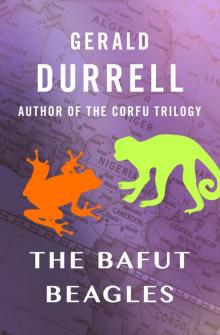 The Bafut Beagles
The Bafut Beagles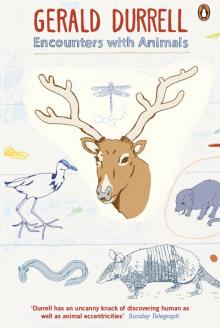 Encounters With Animals
Encounters With Animals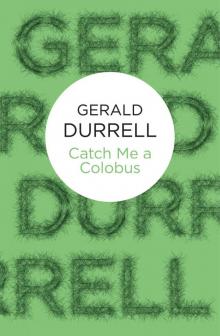 Catch Me a Colobus
Catch Me a Colobus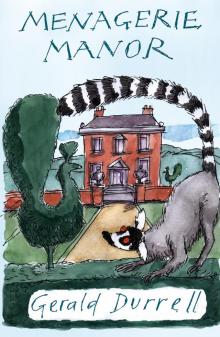 Menagerie Manor
Menagerie Manor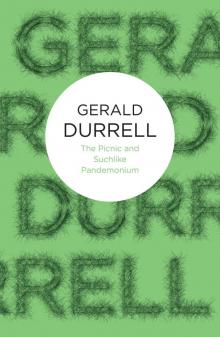 The Picnic and Suchlike Pandemonium
The Picnic and Suchlike Pandemonium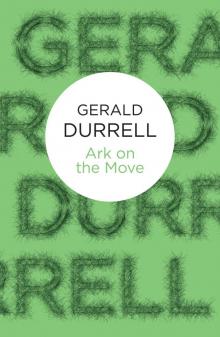 Ark on the Move
Ark on the Move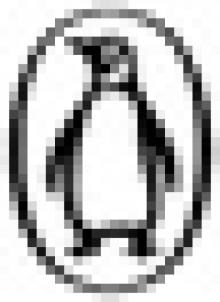 My Family and Other Animals
My Family and Other Animals Two in the Bush (Bello)
Two in the Bush (Bello) The Stationary Ark
The Stationary Ark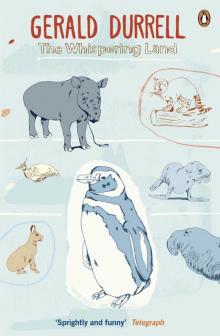 The Whispering Land
The Whispering Land Three Singles to Adventure
Three Singles to Adventure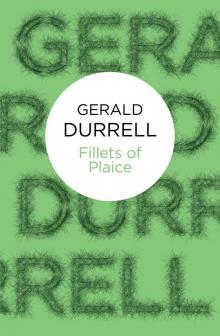 Fillets of Plaice
Fillets of Plaice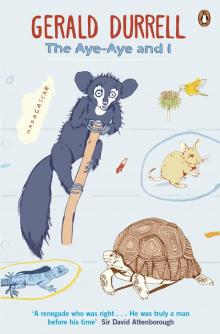 The Aye-Aye and I
The Aye-Aye and I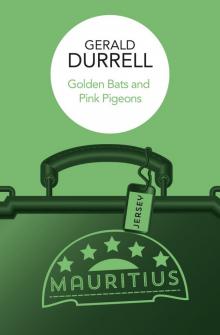 Golden Bats & Pink Pigeons
Golden Bats & Pink Pigeons The Drunken Forest
The Drunken Forest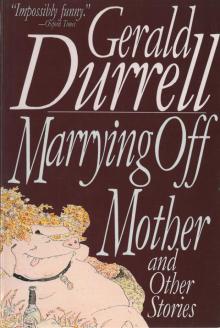 Marrying Off Mother: And Other Stories
Marrying Off Mother: And Other Stories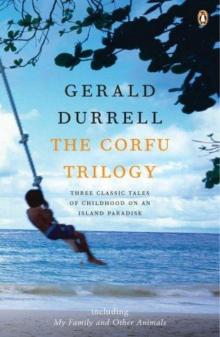 The Corfu Trilogy (the corfu trilogy)
The Corfu Trilogy (the corfu trilogy)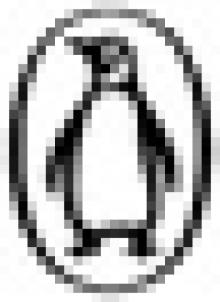 The Corfu Trilogy
The Corfu Trilogy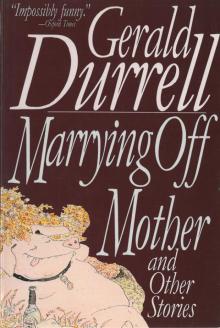 Marrying Off Mother
Marrying Off Mother Two in the Bush
Two in the Bush